
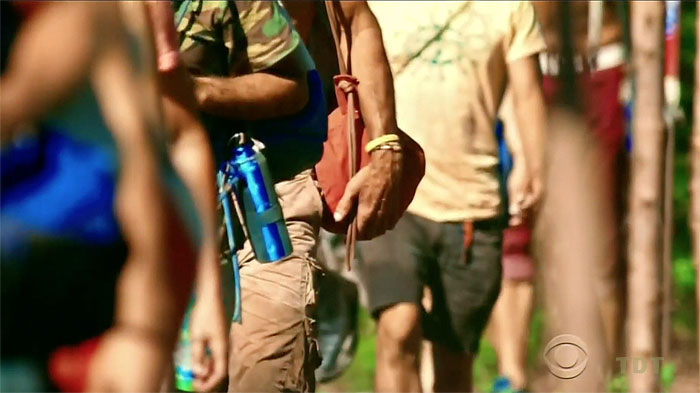
When Survivor: Game Changers debuts in March, there will have been a total of 91 people who have played Survivor more than once. That's almost as many contestants as appeared in the first six seasons, total. Which is a lot! Of these, we've already witnessed the second seasons of 77 of them. That's a large enough sample size to start asking the important questions, such as: Is it a good idea for a former Survivor player to play again? And if so, is that true for everyone?
Which players are the most likely to return?
Since it's already filmed, no amount of hoping and/or pleading is going to change the cast of Game Changers. But with returning player/ "all-star" seasons having become a new staple (two of the last three seasons filmed have been all-returnee seasons; two of the last four as aired), there's a pretty good chance we'll be seeing more of them in the near future. So who (else) is likely to appear? As it turns out, the pool is fairly small: people from very recent seasons, or from the first two, or iconic middle-season stars (Rupert Boneham, Cirie Fields, Ozzy Lusth).
Once upon a time, Survivor didn't do this at all. The show aired seven full all-newbie seasons before filming its first all-star installment (creatively titled All-Stars), and afterwards, Probst swore he would never again host a season with prior contestants. A pledge which, of course, lasted just three seasons, when Guatemala mixed Stephenie LaGrossa and Bobby Jon Drinkard in with 16 newbies. As time has passed, it's become apparent that returnees are much more likely from some seasons than from others. For example: None of those sixteen first-time Guatemala contestants have ever played again. In contrast, a whopping eight people from The Australian Outback have done so, including three people who've played three times each (which will rise to four next season). And that doesn't even include future Fox News personality Elisabeth Hasselbeck, who turned the show's offers down, or Amber Brkich's two times appearing on The Amazing Race.
So what gives? There are at least two factors at play here: recency, and the overall reception of the season. We'll get to recency shortly, but let's explore overall season regard. Borneo and The Australian Outback set the mark for top overall TV ratings, coming at the peak of Survivor's pop-culture relevance, and its cast members remain iconic Survivor contestants, especially those who lasted into the jury phase (even if names like Keith have been usurped by more-recent players). The show seems happy to have those contestants back. The following three seasons saw a decline in both popularity ratings-wise, and in fan opinion. EW's Dalton Ross ranks Thailand as the third-worst season ever. While the season had a few memorable, colorful players (Brian Heidik, Helen Glover, Shii Ann Huang, Robb Zbacnik), only Shii Ann has ever played a second time. This pattern repeats as the seasons progress: Fiji and Nicaragua? Collectively underappreciated, as are their casts, with just one returnee each. See the full counts below:
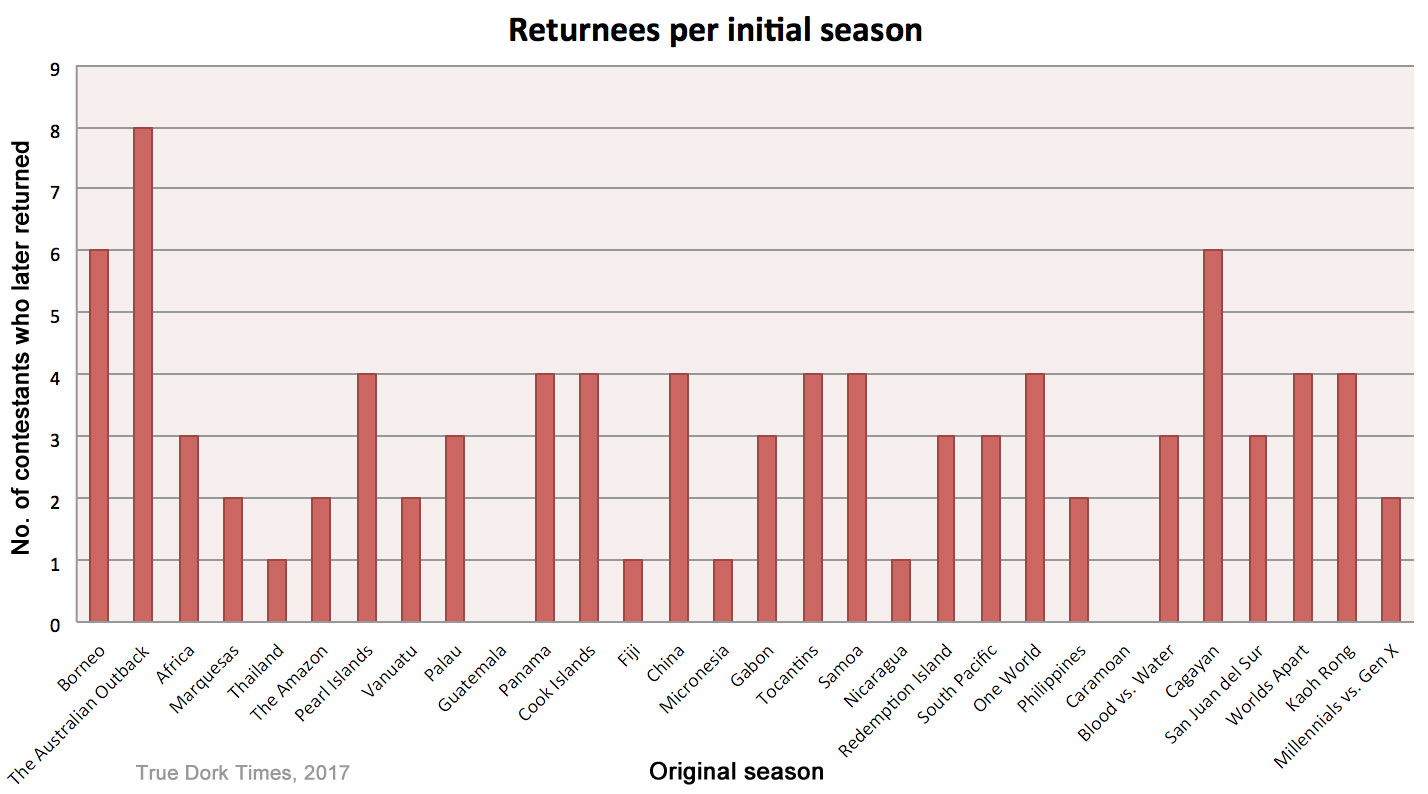
At a certain point, though, recency overtakes reception, because although very few fans enjoyed One World, it has already yielded four returnees, none of whom are its universally beloved winner, Kim Spradlin. In contrast, despite its general awfulness, everyone seems to love Micronesia, and just one of its ten new contestants has ever been back (Erik Reichenbach). And with all-returnee seasons cropping up every third or fourth season for the foreseeable future, recency looks likely to remain a major driver in future return appearance invitations.
Will there ever be a rainbow? - The wait between 1st and 2nd appearances
So let's say you're a just-played Survivor alumnus/a, and you decide you want to play again. (The pool of potential re-players here would be approximately all of them.) How long can you reasonably expect to wait before doing so? The answer, perhaps not surprisingly, is: Not very long.
If you sample casual fan sentiment on Survivor's facebook posts or the CBS.com site, the just-appeared contestants generally have the most supporters. Toss out a news item on a pre-juror from a few seasons ago, and they'll say, "Who?" Recency bias also intuitively should make current contestants seem more attractive to the people asking them back. No matter how great some player from 15-20 seasons back may have been, there's a good chance at least one of the key network suits that must approve them has only held their current job for the past two years, and has never even heard of that contestant, whereas they're moderately familiar with (and maybe signed off on the first time) the colorful headline-maker from last year.
And the numbers seem to bear that out (see graph below). For returning players, the four most likely spaces between first and second appearances are, in order: two seasons, one season, no seasons (i.e. back-to-back appearances), and three seasons. The median gap is exactly three, the mean is 5.3 seasons. There's a pretty steep drop off after the six-season mark (close to 80% of all second appearances come from a gap of six seasons or fewer). After about nine seasons off, a contestant's chances of returning are close to zero. Sad!
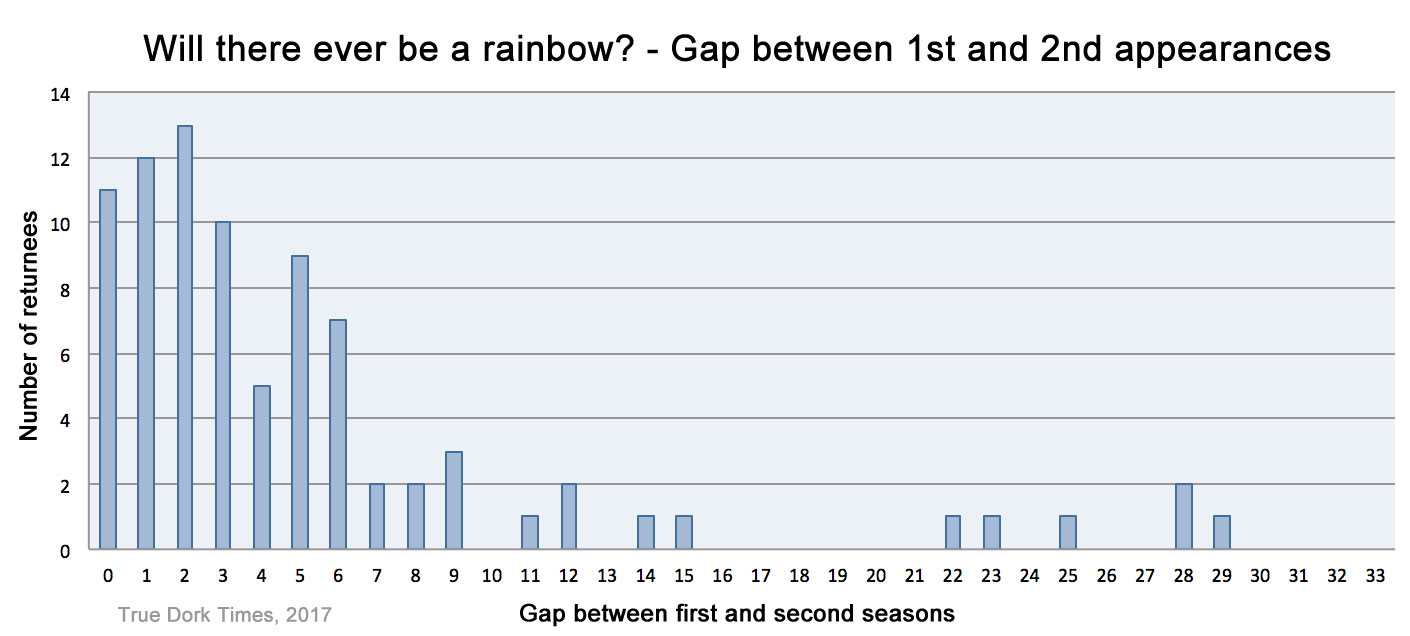
What's the take-home message from this? Time is short, and it's even shorter for reality TV. After about three years, Survivor contestants have reached their expiration date if they haven't yet played a second time.
So for fans hoping for more seasons from yet-to-return people from the relatively recent stretch of seasons from Nicaragua through One World: don't keep hope alive. That window has pretty much closed (except for the winners, who are uniquely qualified for an all-winners season that almost certainly will happen eventually). Same thing, but moreso, for the 20 seasons before that. Obviously, it's not completely impossible, since we had one first-time returnee from Borneo in Blood vs. Water (Gervase Peterson) and another Borneo-er plus two Australian Outback-ers in Cambodia (Kelly Wiglesworth, Kimmi Kappenberg, and Jeff Varner). But don't hold your breath for anyone not on the first two seasons.
Yes, fine, but was it worth the wait?
So great, your favorite player finally gets to play again, after an interminable wait of zero-to-29 seasons (but most likely, under six). Ignoring every other factor, and looking just at how long they've waited to play again, how will they do? Well... we have some good news for you: We have no idea.
As the graph below shows, there's no correlation whatsoever (R^2 = 0.00047) between the time off between first and second appearances and the days played in the second season.
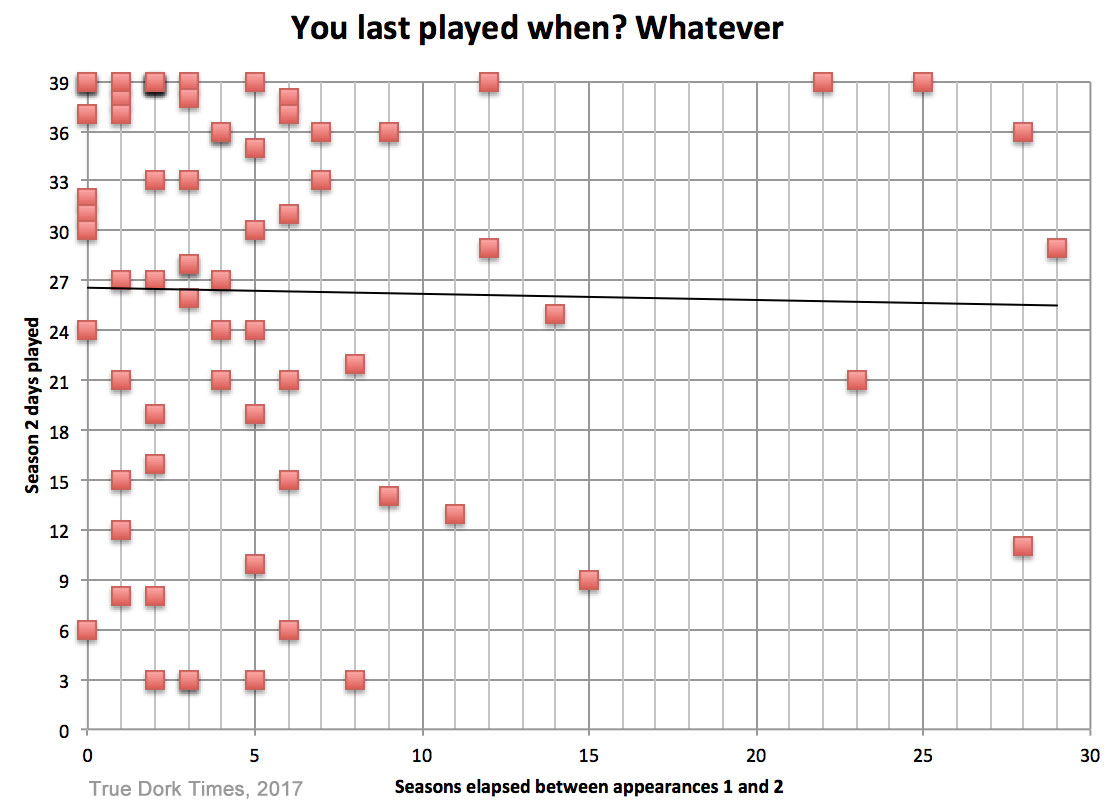
So that means there'd be no expectation that Kimmi and Varner, who left The Australian Outback on consective pre-jury votes, would end up in similar positions when both showed up 29 seasons later on Cambodia, right? Right. And they didn't. So is there another, better predictor of second-season success?
Let's find out.
All-Stars? Or mixed newbies and returnees?

So let's say you're an about-to-be two-time contestant. Your spot on an upcoming season has been locked in by Lynne Spillman herself. Should you be hoping for an all-star season, or one in which new contestants are mixed with returning players?
The conventional wisdom states that of course a second season should always be played against complete neophytes, because returnees re-enter with a massive advantage due to their prior experience playing a physically demanding social-strategic game in front of TV cameras. Just look at Stephenie in Guatemala, or Parvati, Amanda, and Cirie in Micronesia, or Coach in South Pacific, or Skupin in Philippines, or Cochran and Dawn in Caramoan!
But looking at the entire data set, that's a potentially flawed conclusion, because it overlooks Fairplay and Yau-Man in Micronesia, and Russell Hantz in Redemption Island, and Francesca in Caramoan. So we looked at every returnee in mixed vs. all-star formats, and how many days they played in their second seasons.
| All-Star | Mixed | |
|---|---|---|
| Total contestants* | 46 | 27 |
| Mean days played season 1 | 33 | 31 |
| Mean days played season 2 | 25 | 28 |
| Change in days played | -8 | -3 |
(*Notes: We removed any second-timer who left the game for reasons other than being voted out, such as Sue Hawk in All-Stars, or Jonathan Penner in Micronesia. So this should be purely based on actual gameplay.)
As it turns out, on average, neither format is a slam-dunk for the returnees. Look at the change in days played from the first appearance to the second: Eight fewer days in an all-star format, three fewer in mixed. So yes, as expected, the mixed format produces better results, but only by 5 days, or about two episodes. And neither, on average, moves you closer to the million. Obviously, when you divide our previously large-ish pool of 77 returning games roughly in half and remove a few, the sample sizes are a bit smaller, and it's possible with more mixed seasons, that change in days could turn positive. (Dear Survivor: Please let's not test that.) But for now, on average, it doesn't look great.
But as we said at the outset, not every returnee comes back to the game with the same résumé. Game Changers, for instance features both someone medevacced on Day 9 and someone who's reached Day 39 and won, twice. Is the average result above true for everyone?
No.
Okay, fine, we'll show our work: Let's go with the all-star format results first. The correlation isn't spectacular (R^2 = 0.45), but there's a pretty clear trend that argues results in the second season get worse the more days a contestant played the first time. Again, this is partially because a lot of second-time players tend to be prior finalists or winners, and there's simply no way for them to play more days the next time, because Survivor longevity has an upper ceiling of 39 days. (The one exception is the most extreme example demonstrating that - Tina and Colby entered All-Stars guaranteed to play at least three fewer days, simply because The Australian Outback lasted a head-scratching 42 days. Of course, it ended up not being relevant since they both played a lot fewer than 39 days in All-Stars.)
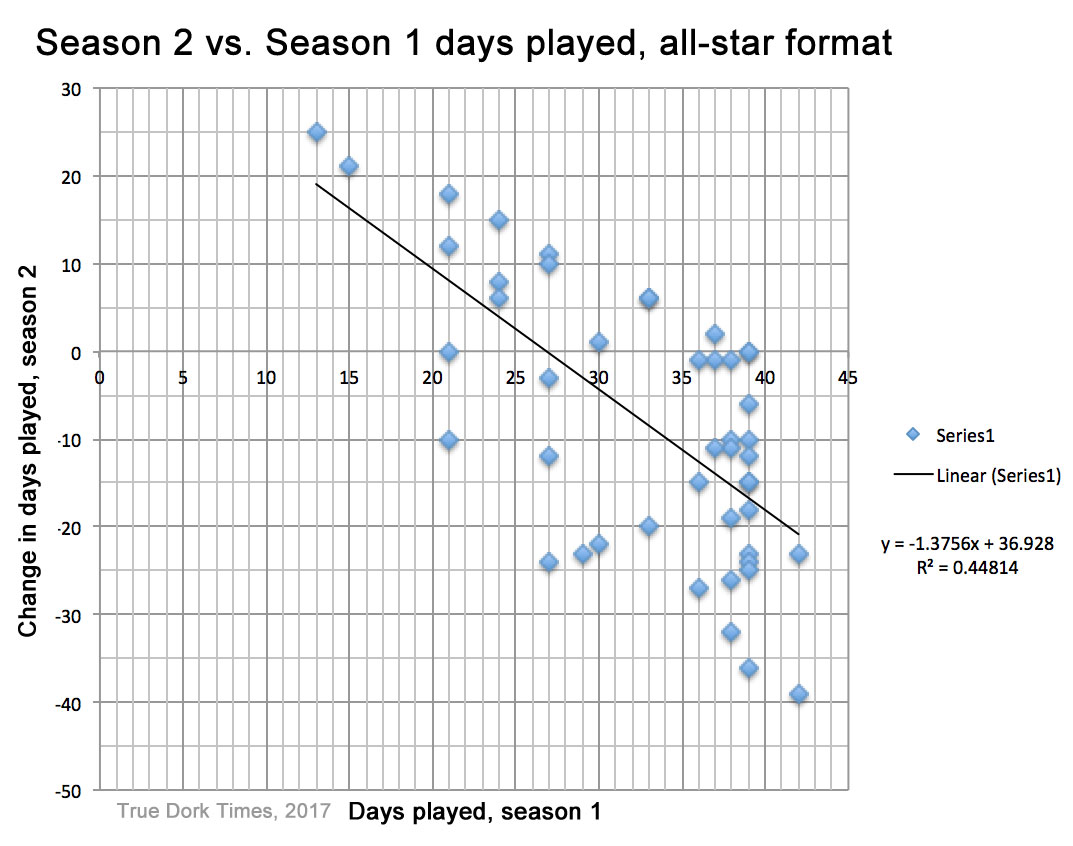
But with those caveats aside, the trendline seems like a fairly good fit for the data. One key observation: Once the contestant has played more than 27 days in their first season, the trendline turns negative. There are only three people who lasted beyond Day 28 their first season who did better the second time, out of the 35 people who met that cutoff. That's a pretty poor return on investment. Meanwhile, all but one (Jeff Varner) of the nine out before Day 25 their first time did better on attempt #2.
So if you're a big fan of say, Day 9 evacuee Caleb Reynolds... good news! Game Changers has a good chance of bringing you an improved outcome over Kaoh Rong. In contrast, if you are hoping Tai Trang can learn from his non-winning finalist performance and put it all together as a Game Changer... um... well, keep hope alive?
We see essentially the same trend when we look at these data for mixed newbie/returnee format seasons:
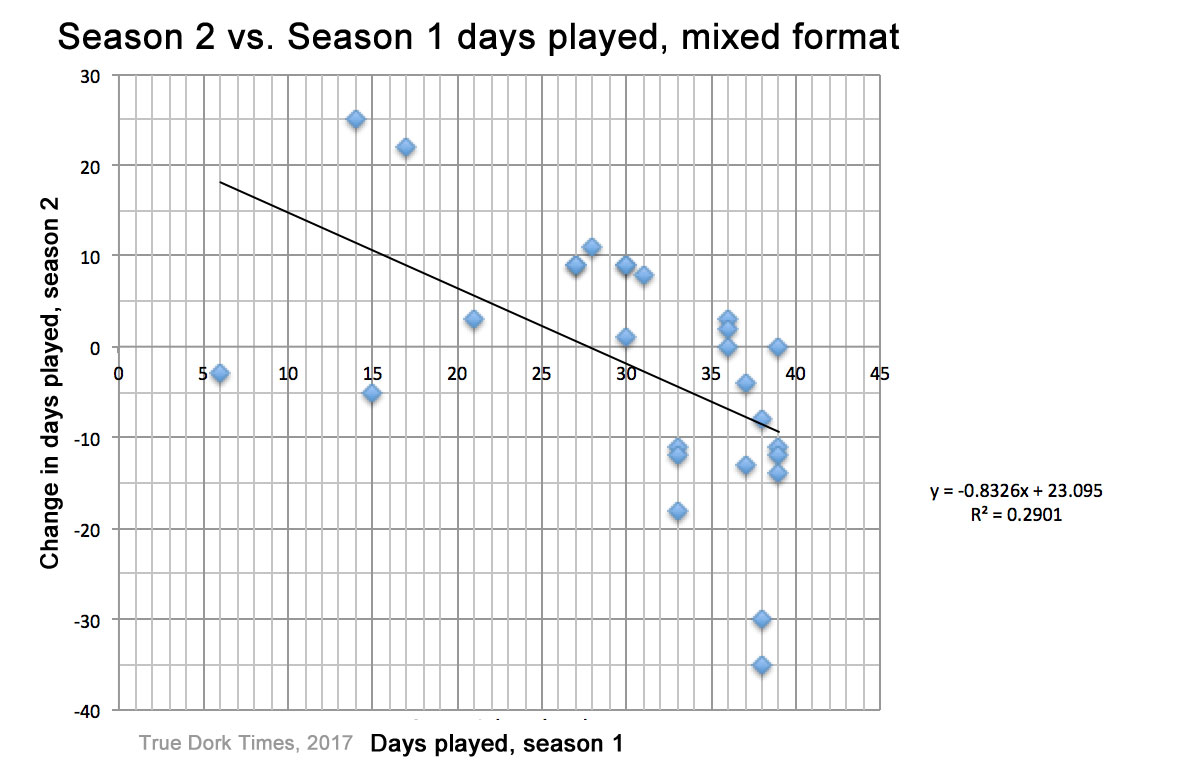
The correlation isn't as good (R^2 = 0.29), because the data is both more noisy and involves a lot smaller sample size. Even so, the trendline still looks like a decent fit. Interestingly, that line crosses the X axis at about the same point (27 days). The actual data points don't have the same extreme division where almost all pre-Day 27 people do better and almost all post-Day 27 do worse, but because there are smaller numbers of players in this set, maybe other factors have more of an impact. Like, say, women and minority players tending to be voted out early in recent seasons (which could help explain why Francesca's Caramoan performance is such an outlier, and makes us worry for what should otherwise be a great opportunity for Cirie Fields in Game Changers).
Thankfully, Game Changers is an all-star format season, so we project from the better data set. But with the tenth anniversary of Micronesia and fifth anniversary of Caramoan drawing near, the possibility of another Fans vs. Favorites gimmick for Survivor 36 seems depressingly plausible. Still, maybe there's hope for the Game Changers who hope to improve on a sub-27-day longevity.
Back-to-back or nah?
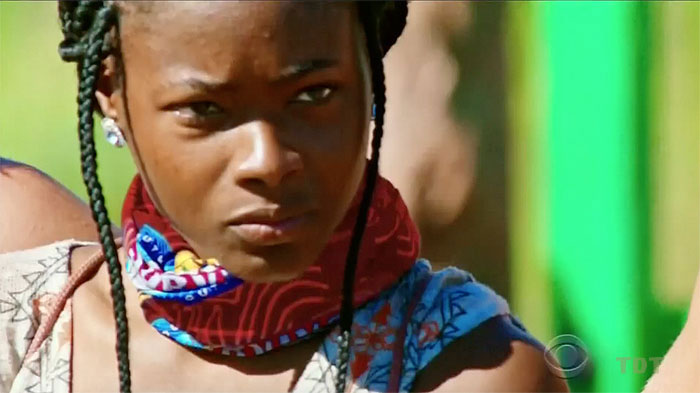
One further Game Changers-related question one might have is: With two people from Millennials vs. Gen X coming back to play in the very next season, does it help or hurt a contestant to play in back-to-back seasons?
We can answer that by taking all the players who appeared in consecutive seasons (Rupert Boneham, Amanda Kimmel, James Clement, Russell Hantz, Malcolm Freberg, and Shirin Oskooi, although Shirin should probably have an asterisk since Worlds Apart had finished airing before Cambodia's cast was even selected, and her two seasons weren't actually filmed back-to-back*), and compare their change in days played to that of all returnees.
*As Sarah Channon points out, also Joe Anglim. Asterisks for the asterisks!
The answer: The average non-back-to-back player (including both all-star and mixed formats, for 67 total players) lasted 32 days the first time, 26 the second, for a net -6 days played in the return appearance.
The six back-to-back players averaged 34 days played their first time, and 30 the second, for a net -4 days. Big deal.
There is of course a huge variation in those six samples, so the mean is probably essentially meaningless at this point. And good news! We won't bother graphing it. But since you're probably asking: taking out Shirin's performances, the delta between seasons becomes zero: 35 days in season 1, 35 days in season 2.
Even with Shirin's data removed, that difference is still fairly negligible, an improvement of six days is only two episodes. (Again, we must stress that's a really small sample size in the back-to-back group.) Given the physical toll of playing two seasons of Survivor as little as a month apart from each other, is that non-change in days played really enough of a benefit for anyone to put themself through those rigors twice in succession? Obviously, it must be difficult for any contestant to say no when Survivor asks them back. Maybe Survivor should take the initiative and stop asking people to subject themselves to that? Just a thought.
Is third (or fourth) time the charm?
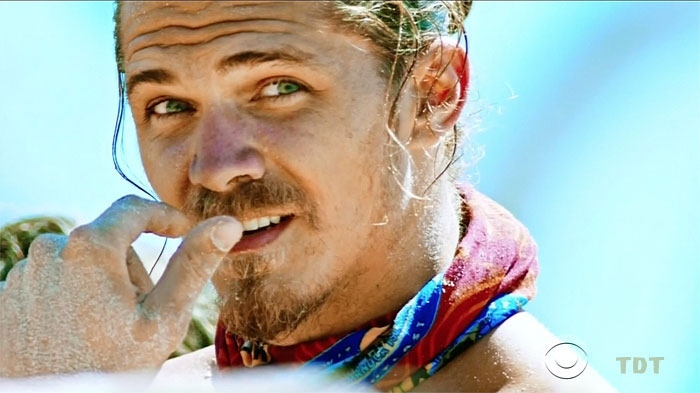
One final question you may be asking: Sure, second-time players are a mixed bag, but don't people always do better the third time? The answer is: Sort of? Third-appearance games appear to more or less follow the same rules as second-time appearances. (Assuming you're okay with drawing conclusions from only 15 people.)
If you look just at the averages, yes, it's the same underwhelming story: Season 2 mean days played = 29 (+/- 3); Season 3 mean days played = 26 (+/- 3), for a loss of three days, or about one episode. Nothing to inspire any former second-timer to immediately race back out for another shot at the million. But again, if you graph out the change in days played between seasons 2 and 3, relative to that player's season 2 finish, you get the same results as above: It's a good idea if you didn't last very long in your second appearance, and not so great if you did.
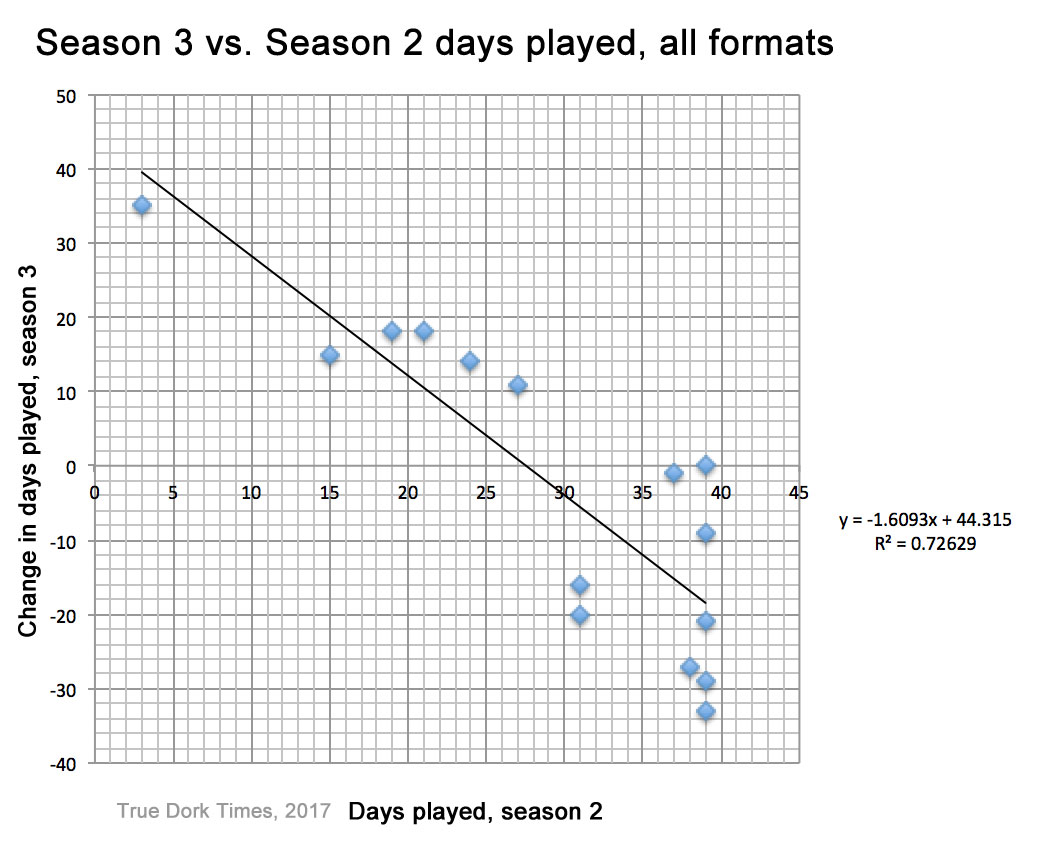
Once again, the trendline hits zero net gain when the preceding season's performance was 27 days. Everyone who lasted fewer days than that improved in season 3, whereas all but one who lasted longer did worse (that exception, of course, is Parvati Shallow, who reached the finals in both Micronesia and Heroes vs. Villains, winning the former). And that same trend is true for our (thus far) two fourth-timers, relative to attempt #3. Rupert Boneham lasted 36 days in Heroes vs. Villains, but just 3 in Blood vs. Water (albeit essentially voting himself out in the latter). Boston Rob Mariano was voted out on Day 18 of Heroes vs. Villains, but won on Day 39 of Redemption Island.
So for any Survivor player contemplating a return appearance, perhaps the best question they should ask first is: Did I play fewer than 27 days the last time? If so, their answer should probably be yes. If they were most recently a non-winning finalist... well, maybe go play Hunted instead, or something. Or talk CBS into making an American version of The Genius.
But if anyone gets a shot at an all-winners season, then all bets are off. Go for it. Someone has to win.
Other Game Changers pre-season commentary
- Dalton Ross at EW.com: "Survivor: Game Changers host Jeff Probst says next season is like Jaws"
- Martin Holmes at InsideSurvivor.com: "CBS Announces Season 34 theme - Survivor: Game Changers"
 Jeff Pitman is the founder of the True Dork Times, and probably should find better things to write about than Survivor. So far he hasn't, though. He's also responsible for the Survivometer, calendar, boxscores, and contestant pages, so if you want to complain about those, do so in the comments, or on Bluesky: @truedorktimes
Jeff Pitman is the founder of the True Dork Times, and probably should find better things to write about than Survivor. So far he hasn't, though. He's also responsible for the Survivometer, calendar, boxscores, and contestant pages, so if you want to complain about those, do so in the comments, or on Bluesky: @truedorktimes
- Recaps index
- Pre-S34: We have to go back! But should we?
- Pre-S34: Could this Game be one for the record books?
- Cast: Game Changers cast projections
- Eps.1-2: Marketing vs. gameplay
- Ep.3: New respect for old goats
- Ep.4: Beaten by a bunch of rules
- Ep.5: Is she acting?
- Ep.6: Viva la reina
- Ep.7: Losses and gains
- Eps.8-9: So who's in charge in here?
- Ep.10: Playing like a Tony
- Ep.11: Why is this season so depressing?
- Ep.12: Back from the brink, maybe?
- Ep.13: Compressed days, compressed plays
- Pre-Ep.14: Jury jeopardy
- Ep.14: Breaking Brad